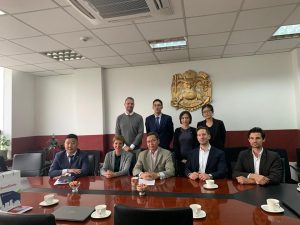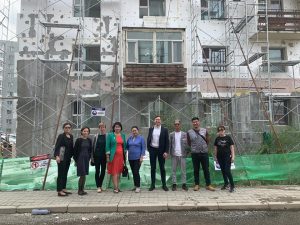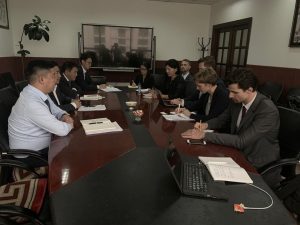July 24, 2019
Ulaanbaatar, Mongolia
 Between the 22nd and 24th of July 2019, the Technical Support Unit (TSU) of NAMA Facility visited Mongolia to assess GGGI’s “Energy Performance Contracting for Residential Buildings Retrofitting” project. The project requested grant financing from NAMA to design a financing mechanism to retrofit 132 residential buildings.
Between the 22nd and 24th of July 2019, the Technical Support Unit (TSU) of NAMA Facility visited Mongolia to assess GGGI’s “Energy Performance Contracting for Residential Buildings Retrofitting” project. The project requested grant financing from NAMA to design a financing mechanism to retrofit 132 residential buildings.
GGGI, together with Ulaanbaatar City’s Mayor’s Office, GIZ, and ICLEI East Asia, facilitated the on-site assessment mission of the TSU. The purpose of the on-site assessment was to verify the initial desk assessment and address specific issues identified. The TSU met with all relevant stakeholders of the project including the Energy Regulatory Commission, Ministry of Environment and Tourism, Ministry of Construction and Urban Development, OSNAAUG, Development Bank of Mongolia Asset Management Company, Ulaanbaatar City District Heating Company, Home Owners’ Associations and construction and retrofitting companies. As part of the on-site assessment, TSU also visited an ongoing project site of UB City in Bayangol District.
The Donors of the NAMA Facility will take into account the results of the on-site assessment when selecting NAMA Support Projects for support of a Detailed Preparation Phase. The result of the onsite assessment will be announced in September, 2019.
The NAMA Facility, a joint climate protection programme for national appropriate mitigation actions (NAMAs) of the German Federal Ministry for the Environment, Nature Conservation and Nuclear Safety, the UK Department for Business, Energy and Industrial Strategy, the European Commission and the Danish Ministry of Energy, Utilities and Climate, has conducted its 6th Call for NAMA Support Project Outlines. In the 6th Call, the NAMA Facility received a total of 51 Outlines. The Outlines have been assessed on their general eligibility, ambition and feasibility based on criteria.
The “Energy Performance Contracting for Residential Retrofitting in Ulaanbaatar City” project developed by GGGI Mongolia with ICLEI East-Asia has been short-listed for an on-site assessment in line with the procedures foreseen in the General Information Document.
Project background
In September 2016, Mongolia ratified its Intended Nationally Determined Contributions (INDCs) to the Paris Agreement on Climate Change in accordance with key national mandates and sectora l policies such as the Green Development Policy (2014) and its Action Plan (2016). Mongolia’s overall commitment is to reduce 14% of greenhouse gas emissions (GHG) by 2030 compared to Business-As-Usual (BAU). One of the main drivers to achieve this goal is to improve energy efficiency in production, distribution, transmission, and usage.
l policies such as the Green Development Policy (2014) and its Action Plan (2016). Mongolia’s overall commitment is to reduce 14% of greenhouse gas emissions (GHG) by 2030 compared to Business-As-Usual (BAU). One of the main drivers to achieve this goal is to improve energy efficiency in production, distribution, transmission, and usage.
The Government of Mongolia set out ambitious targets and goals to improve energy efficiency, conservation of energy and reduce energy losses. Among which, Mongolia’s Green Development Policy and INDC document set out a goal to reduce building heat loss by 20% by 2020, and 40% by 2030.
Although there have been a number of legal and regulatory improvements to achieve energy efficiency potential in Mongolia, there is a gap in terms of residential buildings. In aggregate terms, this sector represents 40 per cent of energy consumption, more than industry and transport sectors combined. The residential building sector thus has greater potential to reduce energy demand and ultimately to reduce CO2 emissions.
Ulaanbaatar (UB) City has the highest number of building stock in Mongolia. According to its Mayor’s Office, there are 1077 pre-cast concrete buildings in UB city which have high building heat loss. The Mayor’s office has developed a sub-program to carry out thermal-technical retrofits (TTR) for these buildings, starting with 375 building blocks that have passed the earthquake resilience test. UB City, ICLEI East-Asia, and GGGI are actively seeking to attract financing and carrying out necessary preparations to implement the TTR projects in UB City.
About NAMA-Facility:
 As announced during the climate negotiations 2012 in Doha, Qatar, the German Federal Ministry for the Environment, Nature Conservation and Nuclear Safety (BMU) and the Department for Business, Energy and Industrial Strategy (BEIS) of the United Kingdom (UK) jointly established the NAMA Facility. NAMA Facility vision is to Accelerate low carbon development to keep temperature rises to well below 2°C by financing measures that shift challenging sectors in a country towards a sustainable, irreversible, low carbon pathway.
As announced during the climate negotiations 2012 in Doha, Qatar, the German Federal Ministry for the Environment, Nature Conservation and Nuclear Safety (BMU) and the Department for Business, Energy and Industrial Strategy (BEIS) of the United Kingdom (UK) jointly established the NAMA Facility. NAMA Facility vision is to Accelerate low carbon development to keep temperature rises to well below 2°C by financing measures that shift challenging sectors in a country towards a sustainable, irreversible, low carbon pathway.